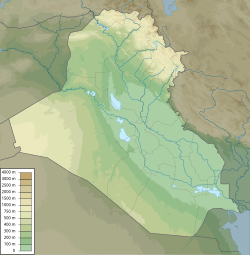Najaf
ٱلنَّجَف Najaf al-Ashraf, Baniqia | |
|---|---|
Top-bottom, L-R: Aerial view of the Imam Ali Shrine • Entry to the Imam Ali Shrine • Khan Al Musalla • Statue of Jawahiri • Rural Najaf • Inside Imam Ali Shrine | |
 | |
| Coordinates: 32°00′00″N 44°20′00″E / 32.00000°N 44.33333°E | |
| Country | |
| Governorate | Najaf |
| Founded by | Hārūn al-Rashīd |
| Government | |
| • Type | Mayor–council |
| • Mayor | Yusuf Kinawi |
| Elevation | 60 m (200 ft) |
| Population | |
• Estimate (2018)[1] | 747,261 |
| • Rank | 10th[2] |
| • Metro | 988,000 |
| Time zone | UTC+3 |
Najaf (Arabic: ٱلنَّجَف), is the capital city of Najaf Governorate in central Iraq about 160 km (99 mi) south of Baghdad. Its estimated population in 2024 is about 1.41 million people.[1] It is widely considered amongst the holiest cities of Shia Islam and one of its spiritual capitals, as well as the center of Shia political power in Iraq.[8] It is the burial place of Muhammad's son in law and cousin, ‘Alī ibn Abī Tālib, and thus a major pilgrimage destination for Shia Muslims. The largest cemetery in the world (Wadi-us-Salaam) and the oldest Shi'a Islamic seminary in the world (Hawza of Najaf) are located in Najaf. Due to Najaf's position as a holy city in Shia Islam, it is also referred to with the honorific name Najaf al-Ashraf (Arabic: ٱلنَّجَف ٱلْأَشْرَف).
- ^ a b "Iraq: Governorates & Cities".
- ^ "Biggest Cities Iraq".
- ^ Cordesman, Anthony H.; Khazai, Sam (4 Jun 2014). Iraq in Crisis. Rowman & Littlefield. p. 319. ISBN 9781442228566.
- ^ Cockburn, Patrick (8 Apr 2008). Muqtada: Muqtada al-Sadr, the Shia Revival, and the Struggle for Iraq (illustrated ed.). Simon and Schuster. p. 146. ISBN 9781416593744.
- ^ Pollack, Kenneth M.; Alkadiri, Raad; J. Scott Carpenter; Kagan, Frederick W.; Kane, Sean (2011). Unfinished Business: An American Strategy for Iraq Moving Forward. Brookings Institution Press. p. 103. ISBN 9780815721666.
- ^ Robinson, Linda (2005). Masters of Chaos: The Secret History of the Special Forces (illustrated, reprint ed.). PublicAffairs. p. 260. ISBN 9781586483524.
- ^ "Ali al-Sistani is Iraq's best hope of curbing Iranian influence. But he is 85 and has no obvious successor". The Economist. 5 December 2015. Retrieved 6 December 2015.
- ^ [3][4][5][6][7]






